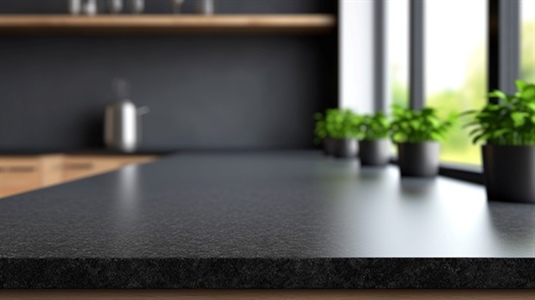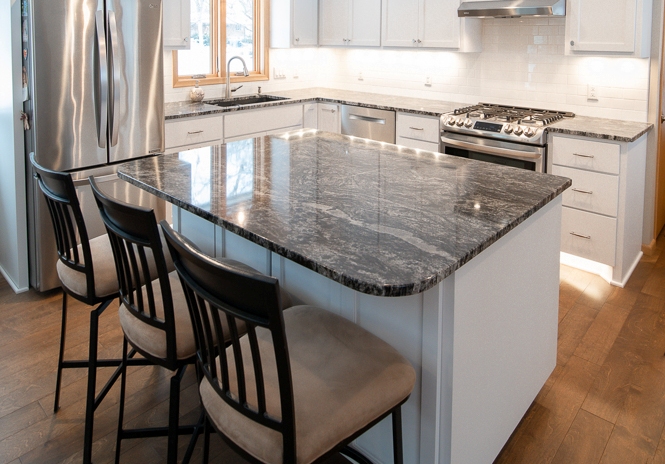Countertops: Granite vs Quartz

Deciding between granite and quartz countertops can be as challenging as it is exciting. Both materials bring their unique beauty and functionality to a kitchen, making the choice a pivotal part of any remodeling project. As we dive into the world of countertops, we'll explore the distinctive qualities that make granite and quartz favorites among homeowners. Whether you're updating your kitchen to create a more inviting space for family gatherings or aiming to increase your home's value, understanding the nuances of these materials is key.
Granite, with its natural, one-of-a-kind beauty, offers a touch of the earth's artistry to your kitchen. Each slab tells a story, with patterns and hues that are as unique as they are beautiful. On the other hand, quartz countertops, engineered for perfection, provide a consistency in appearance and strength that appeals to those looking for both style and durability. In the following sections, we'll delve deeper into the pros and cons, maintenance requirements, and cost considerations of granite versus quartz countertops, providing you with the information you need to make an informed decision for your home.
Choosing the right countertop is not just about picking a material; it's about reflecting your home's personality and your lifestyle. As we explore the characteristics, benefits, and considerations of granite and quartz, we invite you to envision how each option would fit into your daily life and overall design aesthetic. Join us as we navigate the complexities of these popular countertop choices, helping you to discern which material will best suit your needs and dreams for your kitchen space.
What is Granite?
Granite is a natural stone that has captivated homeowners and designers for decades with its inherent beauty and durability. Formed from the cooling of magma beneath the Earth's surface, granite is a plutonic rock composed primarily of quartz, feldspar, and mica. This unique composition gives granite its distinctive appearance, with a speckled pattern that varies from slab to slab, ensuring that no two granite countertops are exactly alike.
One of the most appealing aspects of granite is its variety. Available in a wide range of colors and patterns, granite can complement any kitchen design, from classic to contemporary. The stone's natural hardness makes it resistant to scratches, heat, and wear, making it an ideal choice for high-traffic kitchen surfaces. However, granite does require periodic sealing to maintain its resistance to stains and moisture, a small concession for the beauty and longevity it brings to your kitchen.
Aside from its practical advantages, granite offers an eco-friendly option for homeowners. As a natural material, it doesn't emit harmful chemicals and can last a lifetime, reducing the need for frequent replacements. Its timeless elegance and the unique story told by each slab can add significant value to your home, making it a preferred choice for those looking to combine aesthetic appeal with practical functionality in their kitchen remodeling projects.

What is Quartz?
Quartz countertops are synonymous with modern elegance and durability. Unlike granite, which is a natural stone, quartz countertops are engineered from crushed quartz stones bound together with resin. This manufacturing process not only makes quartz countertops incredibly strong and non-porous but also allows for a wider variety of colors and patterns than typically found in natural stone. The consistency in color and texture makes quartz an excellent choice for homeowners seeking uniformity and precision in their kitchen design.
The non-porous nature of quartz makes it exceptionally resistant to staining, bacteria, and mold, making it an ideal surface for kitchens and bathrooms. Unlike granite, quartz does not require sealing, making it a low-maintenance option for busy households. Its durability is comparable to granite, resisting scratches, chips, and heat, although direct exposure to high temperatures should be avoided to maintain the integrity of the resin.
Quartz countertops also offer an eco-friendly advantage. The materials used in quartz countertops can include waste stone and can be produced with a lower carbon footprint than natural stone options. Furthermore, their durability and long lifespan contribute to their sustainability. With advancements in manufacturing technology, quartz can mimic the look of natural stone, providing homeowners with the beauty of granite or marble, coupled with the added benefits of strength and maintenance ease.
Differences in the Appearance of Granite and Quartz
The appearance of granite and quartz countertops is one of the most distinguishable factors between these two materials. Granite, being a natural stone, boasts a unique pattern on each slab. Its beauty is defined by irregular veining, color variation, and natural imperfections, making each granite countertop one-of-a-kind. The depth and richness of granite's natural colors are unparalleled, with a three-dimensional appearance that varies under different lighting conditions.
Quartz, on the other hand, offers consistency in patterns and colors, achieved through its engineered manufacturing process. This consistency allows for precise color matching across multiple slabs, making quartz ideal for large projects or where uniformity is desired. The patterns in quartz countertops are more controlled and predictable, with a wide range of colors available, from monochromes to replicas of natural stone. The appearance of quartz can be engineered to mimic that of granite or marble, providing a versatile range of design options.
While granite's charm lies in its natural irregularities and the story each slab tells, quartz provides a sleek, modern look with its uniformity and the ability to imitate other materials. The choice between granite and quartz often comes down to personal preference for natural beauty versus engineered perfection. Each material offers a unique set of aesthetic attributes that cater to different design styles and preferences, making the decision a deeply personal one based on the desired ambiance and functionality of the space.
Differences in the Price of Granite and Quartz
The cost of granite and quartz countertops can significantly influence a homeowner's decision when remodeling their kitchen. Granite, with its natural variation, typically has a price range that reflects the rarity and uniqueness of each slab. The cost can vary widely based on color, finish, and origin of the stone. Generally, granite can be more budget-friendly for entry-level options but can also reach higher price points for exotic varieties.
Quartz, being an engineered product, tends to have a more predictable price range. The cost is influenced by the quality of the quartz and the complexity of the manufacturing process. While quartz may have a higher starting price than the most basic granite options, its price ceiling is often lower than the most premium granite selections. This makes quartz a mid-range option that offers a balance between cost and the advantage of having a uniform, durable surface without the need for periodic sealing.
Ultimately, the decision between granite and quartz will depend not only on the initial investment but also on considerations such as maintenance costs, durability, and the potential impact on home value. Both materials offer their own set of benefits that justify their cost, making it essential for homeowners to weigh these factors based on their specific needs and preferences.
Maintenance & Durability of Granite and Quartz
When it comes to maintenance and durability, granite and quartz countertops offer distinct advantages and considerations. Granite, as a natural stone, requires a bit more attention to maintain its beauty and functionality. It needs to be sealed periodically to protect against stains and moisture absorption. Despite this maintenance requirement, granite is highly durable, resisting scratches, heat, and other kitchen mishaps, making it a long-lasting choice for many homeowners.
Quartz, by contrast, boasts ease of maintenance as one of its primary benefits. Its non-porous surface doesn't require sealing, making it more resistant to staining and bacterial growth. Quartz is also durable, but its engineered nature means it can sometimes be less tolerant of excessive heat. Proper care, including the use of trivets and cutting boards, will help ensure its longevity.
Both materials are solid choices for countertops, offering durability that can withstand the rigors of daily kitchen use. The decision between granite and quartz often comes down to personal preference for natural beauty and individual maintenance routines versus engineered strength and ease of care. Understanding the maintenance and durability of each can help homeowners make an informed decision that aligns with their lifestyle and design preferences.
How TLC Remodeling Can Enhance Your Countertop Experience
TLC Remodeling specializes in transforming kitchens into beautiful, functional spaces that reflect homeowners' styles and needs. With expertise in both granite and quartz countertops, TLC Remodeling offers personalized consultation services to help you choose the right material for your lifestyle and design preferences. Their team of experts ensures a seamless installation process, paying close attention to detail and quality craftsmanship.
Understanding the importance of durability and maintenance, TLC Remodeling provides homeowners with comprehensive care instructions, ensuring your new countertops remain beautiful and functional for years to come. By choosing TLC Remodeling, you're not just getting a contractor; you're partnering with a team dedicated to bringing your vision to life, with the expertise to recommend the best materials for your project.
Whether you're drawn to the natural beauty of granite or the engineered resilience of quartz, TLC Remodeling's commitment to excellence and customer satisfaction makes for the ideal choice for your kitchen remodeling project. Contact TLC Remodeling today to help you make an informed decision that enhances the beauty and value of your home.